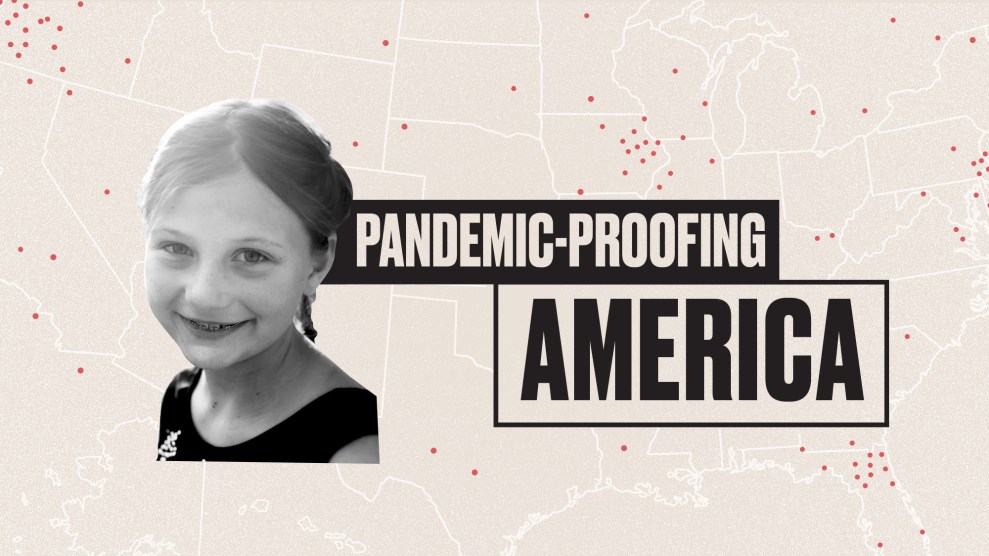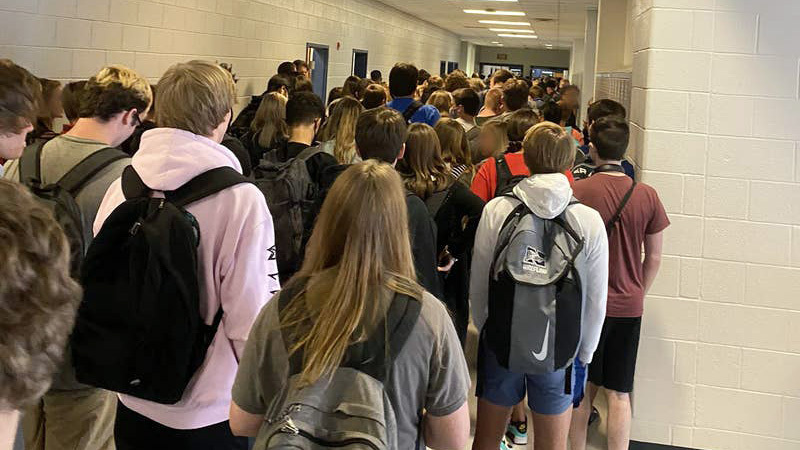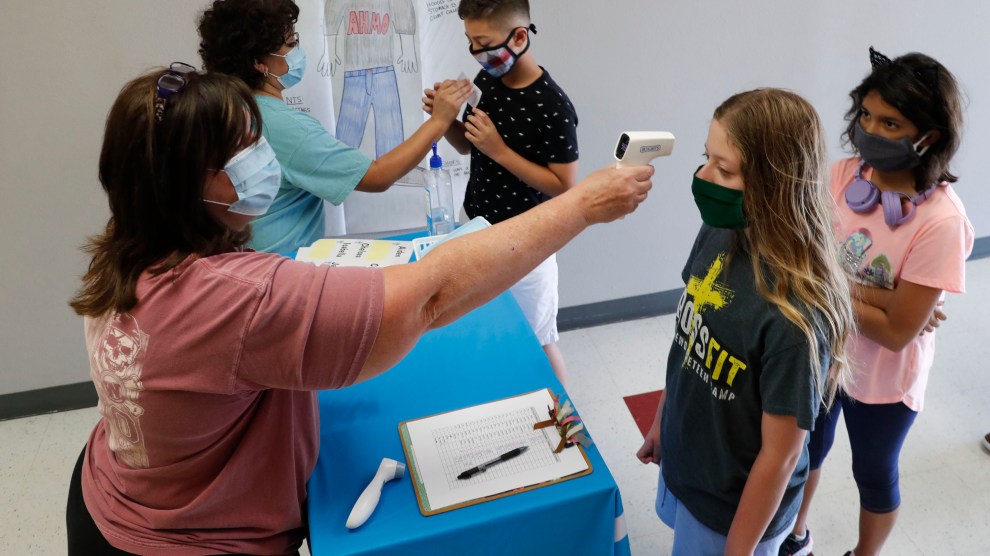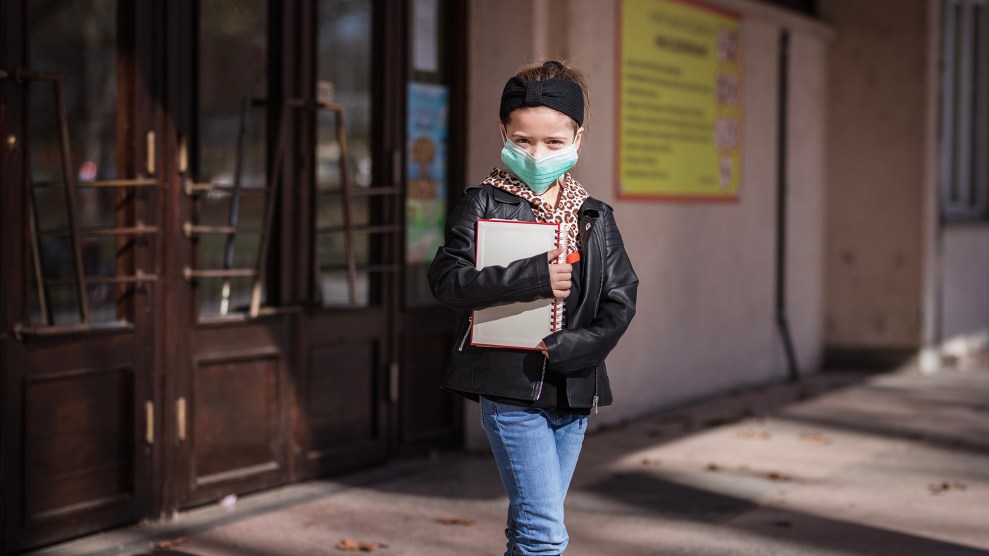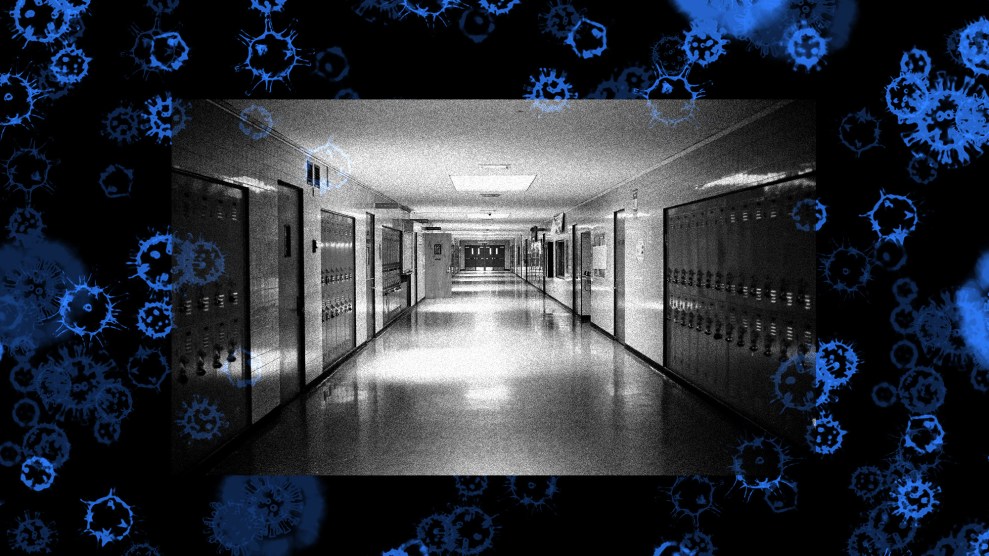
Mother Jones illustration; Getty
A few weeks ago, I saw on Facebook that a social studies teacher at my former high school in Sarasota, Florida, had died from COVID-19. His name was Robert Shackelford, or “Shack” for short. He was 61 years old. One of his colleagues, my former economics and government teacher Christy Karwatt, shared the news: “He taught countless children to love history and he will be missed.”
Last week, I decided to reach out to Karwatt. I had seen through social media the impact Shackelford’s death had on her and many of my former classmates, and I wondered how it would influence the reopening plans of Sarasota High, my alma mater.
While state policy demands all Florida schools reopen for in-person learning or risk losing funding (a policy currently in the middle of a fast-moving legal battle), Karwatt, who I remember as one of my most devoted teachers, told me she will not be returning when the school reopens on August 31. That’s in large part because of Shackleford’s death. “Had that not happened,” she said, she might have been open to going back. They were the same age when he passed, and she says going back is “not worth the risk right now.” Instead, she plans to take a temporary medical leave of absence, delaying the start of her 27th year of teaching at the school.
Ideally, Karwatt said, she’d teach remotely until there was a vaccine or COVID-19 cases in Sarasota’s kids dropped below 3 percent of tested individuals. (As of August 25, it’s about 10 percent.) But that may not be an option, even if Gov. Ron DeSantis’ order is overturned by the courts; reopening plans would still be up to local officials. In mid-July, the Sarasota school board, which is an overwhelmingly white and heavily Republican county, approved a “five-day, brick and mortar instructional plan” that allows students to choose between distance learning and going to school, while teachers are required to be physically present.
Karwatt says many of her peers have stayed silent out of fear of retaliation from the district, but she has been particularly outspoken, participating in protests with other teachers and speaking with national outlets, including CNN and USA Today. When I caught up with Karwatt (whom I struggle to call anything but Ms. Karwatt) via Zoom, we talked about what safety measures Sarasota High is requiring, how she thinks politics have influenced parents’ decisions to send their kids back, what she would say to DeSantis if given the opportunity, and the last heartbreaking text from Shack. Our conversation below has been edited for length and clarity.
How have you been holding up?
Summer was really tough. I think what made it the toughest was because we all dealt with Shack. We kind of had a journey through his hospitalization because we all had a text chain, the social studies department, and we would get daily updates, like, He was a little better today, and then again before he went on the ventilator. We would all text him to try to cheer him up in the hospital. And probably the last text message I got from him—I said, “I’m thinking about you, I’m praying for you, I hope you get better”—and he texts back and he said, “Christy, this monster is trying to kill me.” Those were his exact words.
By the end, he couldn’t text anybody. His parents were going to have to decide to turn off the ventilator. And so they waited the weekend and then his sisters came down and that’s when they decided to, you know, turn off the ventilator.
Had that not happened, I might have been thinking more, Well if I just mask up and be really careful, I can go back into the classroom. But he and I are exactly the same age. We were talking about retiring at the same time—and he was healthy, 6’4” perfect shape—so I thought, I just can’t take any risk and go back into the classroom. For probably a month, all I would do was my yoga, walk my dogs, and sit on the couch and watch Netflix because I couldn’t read—I love to read—but my mind wouldn’t focus. I was too stressed out.
I know a lot of the teachers are really upset and scared and don’t want to be there. But they have no—I’m lucky. I’m at the end of my career, I can draw from my retirement fund, I have a husband that can help. There are so many that don’t have an opportunity to take the year off, financially.
But it was stressful, and I cried a lot. I have to admit, I cried a whole lot about what to do and what not to do. We all cried over Shack. And that just made it harder.
So that was the deciding factor for you?
That was the deciding factor. I just didn’t think I could emotionally handle the worry of being in the classroom and coming home every day. Because I thought I would be too anxious, and it wouldn’t be fair to the kids if I were anxious, too.
What effect did [Shack’s] death have on the teaching staff as a whole?
Man. Most of them were just—classrooms are just crazy. A lot of people have put plastic shower curtains around their desks, hanging them up so they’re protected, or across the front of the room. I’ve seen people are building plastic barriers because they’re just really afraid of getting the virus.
Dr. St. John, I’m sure you remember her?
Oh, yes. [I had her for English my sophomore year.]
She put in for medical leave, too. And a couple of other teachers did. A couple of the younger teachers put in leaves because they have little children at home and they were afraid for them. Quite a few have put in leaves, so I’m afraid they’re not gonna be able to find teachers. They’re not going to have quality teachers in the classroom and it’s going to be hard. It’s not like people are knocking down the doors to become a teacher anymore. And our subs are usually older retirees, so I don’t know who’s gonna fill in for them.
And you know how they’re doing education in the classroom? They’re putting cameras in the classroom. They didn’t give us the option of teaching remotely. I looked at my roster, one class has five kids that are doing remote, and 22 that are going to be in the classroom. So you’re going to have a camera on you, and you’re going to have to take roll and count the kids that are on Zoom, then you have to take roll and see who’s in your classroom.
The kids are going to be carrying around these plastic dividers to put on their desks. And they have to wear a mask. And at the end of class, either the teacher assigns a kid to do it or the teacher herself has to go and squirt the inside of everybody’s screen and the desk and give the kid a paper towel to wipe off the desk.
It seems like parents, for the most part, would love to see their kids return to school. Obviously they want to do it safely, but is there tension between parents and teachers?
I don’t think there’s that much tension. I don’t think there’s any tension from teachers toward the parents, because we understand that a lot of parents, especially the young ones, they need to work.
We’re just going to be there, kind of like crowd control. There’s not gonna be a lot of education going on. I think the parents, and maybe kids too, are envisioning it’s going to be fun. But the desks are spaced out, they’re going to have their dividers, they’re going to have to wear the mask—I don’t see how that’s gonna work, wearing a mask all day long. I can’t stand it. And they say they’re very serious if [students] get caught without masks: They send you home, and you have to go remote.
In the cafeteria, I think they physically removed every other seat on the tables to prevent kids from sitting next to each other to try to social distance.
In the hallways, when the bell rings, one side of the room goes out on one side of the hallway. And then 30 seconds later, after they’ve almost gotten out, the other side gets to release their kids to go out the other way. It’s not going to be normal school.
I’m surprised so many kids want to show up in person. Why do you think that is?
At the high school level, I think kids just miss their friends. At the elementary level, I think a lot of it is economics and a lot of parents just don’t have a choice because they need child care. And then, this is Florida, where sometimes our politics don’t follow science. So I think politics has a lot to do with it, too. They’re going to go because they don’t believe it’s that serious. I think a lot of parents are sending their kids for that reason.
My stepbrother is actually a student at Sarasota High School. He is choosing to return to the classroom because, in the words of my stepmom, the virtual classes from the spring were “horrendous.” Do you agree? And what do you think about the argument that in-person classes are critical for development?
First of all, let’s talk about what happened in the spring. We shut down immediately. We didn’t have a whole lot of time to plan. The school district developed what it wanted us to do at the district level. And the theme was “grace and compassion.” And it was understandable, because I do have some kids whose parents got laid off, and they had to go work double shifts at Publix, so they didn’t have as much time to spend on their lessons.
But each teacher could only give 25 minutes worth of work a day. And you couldn’t give anybody below a 70 percent unless they did not sign in or if they did absolutely nothing—then you could give them an incomplete. You couldn’t fail anybody. We had the highest graduation rate this year, at Sarasota High, ever. It wasn’t rigorous.
I don’t think a few months of distance learning is going to impact the life of the kid very much. But I think if they get sick or someone in their family gets sick, or a grandparent, that’s going to have a greater impact on them for the rest of their lives. So I just think we have to think of emotional and physical needs that way.
Would you say most teachers are against reopening or are in favor of reopening?
There are some that are in favor, I think. But I think the majority, I would say, probably 75 percent to 80 percent, are opposed in general. Most people I speak to, they don’t want to be in the classroom.
Has there been any organizing among teachers?
Oh, yeah. We had a car protest around the school board office when the school board was meeting [in July]. We had a car protest when we found out that West Palm Beach’s health department was muzzled—it couldn’t recommend that maybe it’s not a good time to open up. And we found out that all the health departments had been told to just give advice about opening up safely instead of [having the option to say], “No, it’s not safe to open.” So we decorated our cars and tooted our horns.
That’s about all we can do, especially because it’s [a decision made at] the state level, you know? Unless we go to Tallahassee, and everybody says it’s pointless because DeSantis has made up his mind, I think. He wants the economy to get better so that it’ll be better by November and it’ll influence the election. That’s my personal opinion.
You mentioned before we started recording that you were depressed over the summer. If you’re comfortable with it, could you talk a little bit more about that?
I felt like I was living in a fog almost. Because, as the numbers were going up, I was watching all the school board meetings. I did talk to a school board member two or three times and he’s like, Well, our hands are tied. What I wanted our board to do was just buck the system. If they all had bucked the system and told the governor, “No, we’re not going to follow your orders,” I don’t think the governor—I mean, that would be political suicide not to fund schools. I felt like you need to challenge him. Just do it.
I’m a tenured teacher. Now, they don’t have tenure anymore; you have one-year contracts, so you can just get fired with almost no cause. And most teachers are afraid to speak out and for their names to be in the news. I think that’s kind of sad, too, that teachers are afraid to speak out. I did have a personal experience once with an assistant principal when I bucked the system, and he took all my honors classes away, all the things I like to teach, and made me teach all on-level the next year. So teachers are just afraid to speak out. And if we don’t get our voices heard, grouped together, it’s not going to change.
So even though you are tenured, you still have the choice of whether or not to speak out. What made you want to talk to the press or even go on CNN and put yourself out there like that?
I’ve always been like that. Maybe it’s my political science background. I would hope in government classes that I’ve taught kids to stand up for your rights or speak out and exercise your political right to do so.
But to me, this wasn’t a political issue at all. To me, this is a health issue. I know some people say that Democrats are making it a political issue. I feel the Republicans are. But I feel that politics should have no place in making these decisions. Science and medicine should be making the decisions as to whether we should go to school or not.
If you could send a message to Ron DeSantis, to speak directly to him, what would you say?
I would say that politics, the economy, his cozying up to Donald Trump is not worth the sickness and maybe the death that his decisions are going to cause. I get so tired of hearing them say, “Well, the death rate is this low.” And doctors are concerned about kids having long-term health problems [after COVID-19]. We don’t know. So if we don’t know, I think I’d rather be cautious instead of gambling with kids’ lives. I would tell him that I think, if people get sick and die, it’s his responsibility if he’s sending them back to school. I hope you can’t sleep at night because of it.
And I do have two friends, one is a teacher—they were Republicans and they switched political parties because of this, because of the pandemic. Even my good Republican friends at school are very angry at Ron DeSantis. This could cost him an election. I heard his PAC hasn’t been able to raise much money lately.
Looking ahead to August 31, how are you feeling in general about schools reopening?
I’m worried for my friends and they’re very worried as well.
It’s going to be kind of depressing on that day that I don’t go back to school. But I just can’t be there. To me, it’s not worth the risk right now. I’m at a point in time in my life that I think about—remember Ms. Glasser? [I nod here; Ms. Glasser was one of my most influential teachers.] She died [following surgery complications] the year before she planned to retire. Mr. Shack was gonna retire next year. I keep thinking about that.
There’s life after work. And money’s important. But it’s not that important.

